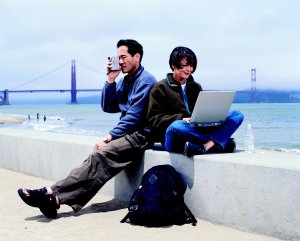Intel survey: vacationers taking, thinking of taking laptops

Photo: Intel
Santa Clara, California — Laptops join swimsuits and sunblock at the top of this summer’s packing list for vacationers, according to the “Intel Unwired Travel” survey(1) released recently by Intel Corporation, the well known computer chip maker.
The survey of U.S. adult computer users commissioned by Intel and conducted by Harris Interactive® reveals that approximately four out of 10 (38 percent) respondents or their families have taken their laptops on vacation and more than half (53 percent) are likely to take a laptop on a future vacation(2).
The top three uses of laptops for vacationers aren’t clearly work-related. The most popular uses were checking or sending personal email (79 percent), entertainment (60 percent) and finding information for vacation planning and activities (48 percent).
Consumers have come to rely on the benefits of an on-the-go, unwired lifestyle on a daily basis. When they travel on vacation they seem to desire the same convenience and freedom.
(1) “A Study about Laptops on Vacations,” an Intel-sponsored online omnibus survey conducted by Harris Interactive® in June 2006.
This survey was conducted online by Harris Interactive on behalf of Intel among 2,689 adult computer users (aged 18 and over) within the United States between June 9 and June 13, 2006. Figures for region, age within gender, education, household income and race/ethnicity were weighted where necessary to bring them into line with their actual proportions in the population. The data were also weighted on the basis of amount of time spent using a computer (in hours per week).
With pure probability samples, with 100 percent response rates, it is possible to calculate the probability that the sampling error (but not other sources of error) is not greater than some number. With a pure probability sample of 2,689 adults one could say with a ninety-five percent probability that the overall results have a sampling error of +/- 3 percentage points. Sampling error for the sub-sample of those who have taken a laptop on vacation (n= 1,252) is +/- 4 percentage points. However that does not take other sources of error into account. This online survey is not based on a probability sample and therefore no theoretical sampling error can be calculated.
(2) Fifty-three percent of U.S. adult computer users indicated they are “very likely,” “likely” or “somewhat likely” to take a laptop computer with them on a future vacation.







